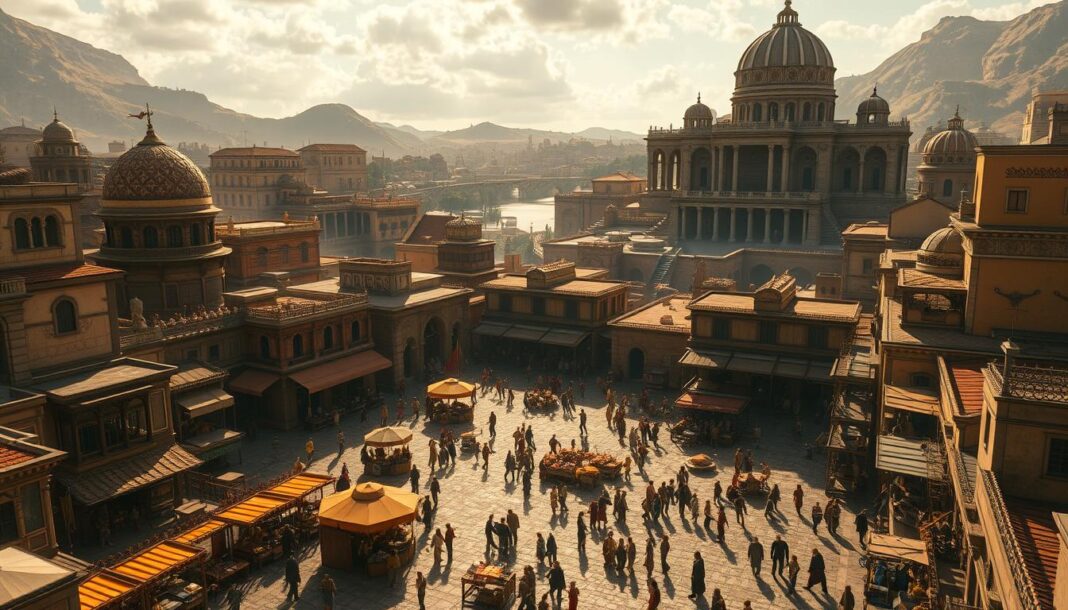We delve into the fascinating world of Pentos, one of the nine Free Cities in the world of Ice and Fire, examining its complex history and cultural significance. Located relatively close to King’s Landing, the capital of the Seven Kingdoms, Pentos is considered the most vulnerable of the Free Cities.
Despite its military limitations, this city has evolved into a major economic power. The unique political structure, featuring a ceremonial Prince and the true power held by the Magisters, contributes to its distinctiveness. We will explore how Pentos maintains its independence and prosperity through a delicate balance of trade, diplomacy, and strategic alliances.
Key Takeaways
- The strategic location of Pentos near King’s Landing influences its economic and political dynamics.
- Pentos has transformed from a simple Valyrian trading post into a significant economic hub.
- The city’s political structure is characterized by a unique balance between the ceremonial Prince and the powerful Magisters.
- Pentos maintains its independence through a combination of trade agreements and diplomatic maneuvers.
- The city’s cultural significance is shaped by its history and geographical location.
The Origins and Historical Development of Pentos
With roots tracing back to the Valyrian Freehold, Pentos evolved uniquely due to its interactions with local Andal populations. Founded as a trading post by merchants, traders, seafarers, and farmers from the Valyrian Freehold, Pentos’s early history was marked by significant cultural exchange.
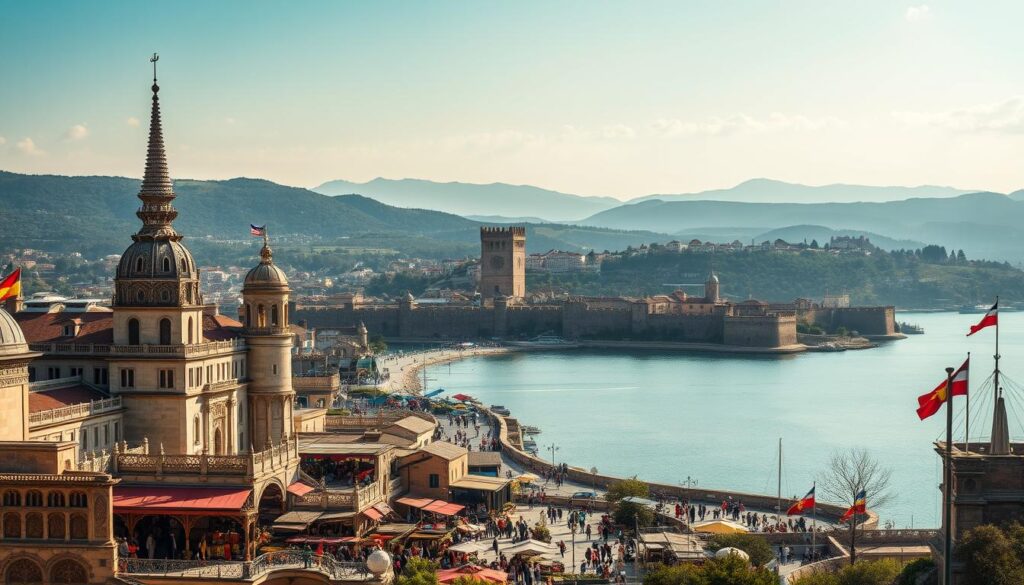
Foundation as a Valyrian Trading Post
Pentos was established by the Valyrian Freehold as a strategic trading post, attracting traders and settlers from various backgrounds. The city’s founders, being largely smallfolk, interbred with the local Andals, distinguishing Pentos from other Free Cities in its less stringent adherence to Valyrian bloodlines.
Evolution Through the Century of Blood
During the tumultuous Century of Blood, Pentos developed its unique identity amidst the power vacuum left by the collapse of the Valyrian Freehold. The city played a crucial role in the alliance against Volantis’s expansionist policies, notably during the War Against Volantis. This period was significant in shaping Pentos’s history and its stance on regional conflicts.
The Six Wars with Braavos and Their Consequences
Pentos engaged in six wars with Braavos between 100AC and 209AC, conflicts that profoundly impacted the city’s trajectory. These wars, fought over issues of slavery and territorial control, resulted in Pentos winning two but losing four, with the final war concluding in 209AC. The peace treaty that followed severely limited Pentoshi military capabilities and led to the abolition of slavery, fundamentally altering the city’s political and economic landscape.
- The establishment of Pentos as a Valyrian trading post laid the groundwork for its future development.
- Pentos’s unique cultural identity was shaped by its interactions with local Andals and its role in regional conflicts during the Century of Blood.
- The six wars with Braavos had lasting consequences for Pentos, including the limitation of its military capabilities and the abolition of slavery.
The years of conflict with Braavos, particularly the war Braavos that ended in 209AC, marked a turning point in Pentos’s history, leading to a new era of peace and redefined its position among the Free Cities.
Geographic and Architectural Features of Pentos Got
The city of Pentos, situated on the eastern shore of the Bay of Pentos, presents a fascinating blend of geographical and architectural features. This place has been shaped by its strategic location and historical significance.
Strategic Location on the Bay of Pentos
Pentos is a port city that stands around the eastern shore of the Bay of Pentos. Its connection to the ruined city of Ghoyan Drohe via a Valyrian road underscores its importance. The city’s position facilitated trade but also created vulnerability to naval threats.
The surrounding land is characterized by the fertile and open Flatlands, where many nobles and Magisters have their estates. These areas are dotted with villages, orchards, farms, and mines controlled by the city.
City Layout and Defensive Structures
Pentos is encircled by massive, high walls, with large, open fields just outside. The Sunrise Gate, which opens towards the east in the direction of the Rhoyne, is a significant architectural feature. These defensive structures have played a crucial role in the city’s history.
Notable Buildings and Districts
The city’s architecture is marked by many square brick towers controlled by the spice traders, and teeming bazaars. Most roofing is done in tiles, contributing to the city’s distinctive skyline. Manses, such as those of Magister Illyrio and Khal Drogo, are notable for their grandeur and security.
| Feature | Description | Significance |
|---|---|---|
| Massive Walls | High defensive structures around Pentos | Historical and defensive importance |
| Sunrise Gate | Gate opening towards the east | Facilitates trade and travel |
| Square Brick Towers | Distinctive architectural feature | Controlled by spice traders, shaping the skyline |
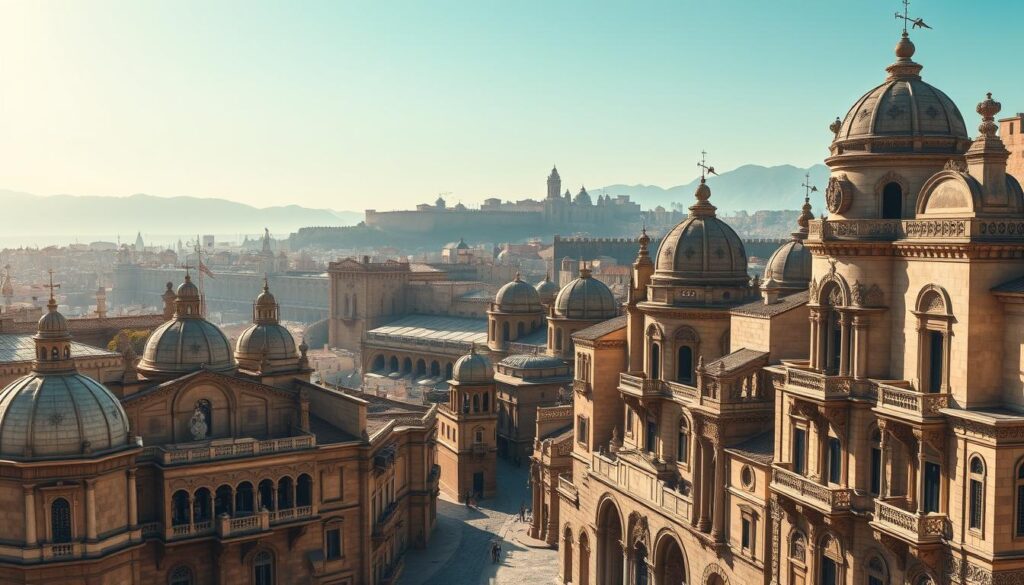
Cultural Identity and Social Structure
With roots tracing back to Valyrians, Andals, and various ancient peoples, Pentos’s cultural identity is multifaceted. The Pentoshi people are a blend of these diverse ancestries, making them perhaps the closest cousins of the people of Westeros. This mixed heritage has contributed to the unique customs and practices observed in Pentos today.
Pentoshi Heritage and Customs
The Pentoshi descend from a myriad of peoples, including Valyrians and Andals. This diverse ancestry has shaped their cultural practices. For instance, Pentoshi men are known for their distinctive grooming practices, such as dyeing and forking their beards with scented oils. The Pentoshi are also known to be great lovers of song, similar to their neighbors, the Braavosi and Lyseni. They are generous to those who please them, showcasing a culture that values entertainment and appreciation.
Religious Practices
Pentos is a melting pot of religious beliefs, with a multitude of gods and faiths being worshipped within the city. The Lord of Light is particularly prominent, with the city’s Red Priests regularly singing their hymns and lighting night fires. This religious diversity reflects the city’s historical role as a crossroads of cultures and trade.
The Complex Relationship with Slavery
Slavery was once a significant part of Pentos’s history, but it was officially abolished after a series of wars with Braavos. However, the practice continues under the guise of “free bond servants,” who are collared and branded in bronze, similar to slaves in other cities like Lys, Tyrosh, and Myr. This complex relationship with slavery highlights the tension between official policies and actual practices in Pentos.
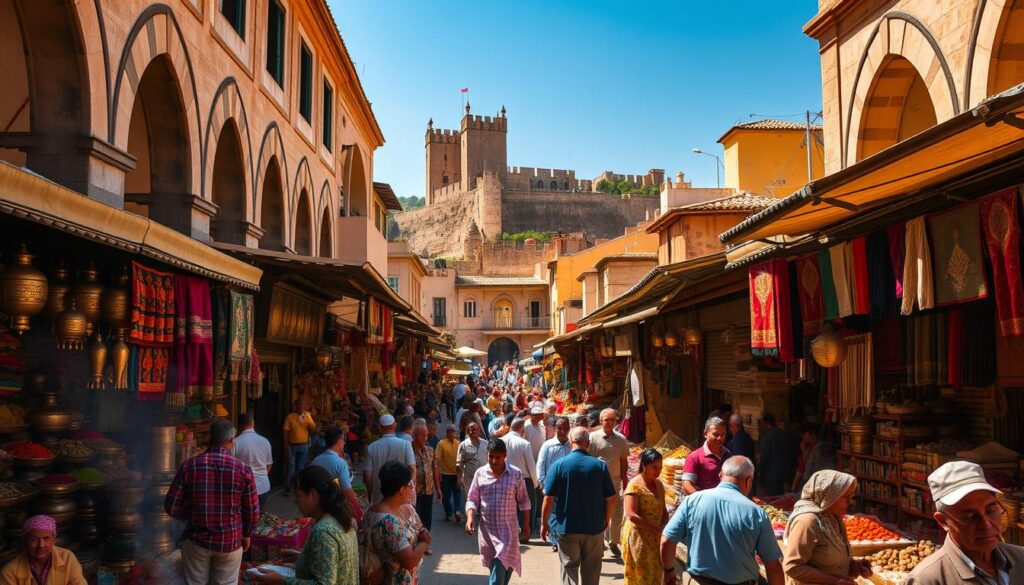
The cultural identity of Pentos is thus a complex interplay of its diverse heritage, customs, religious practices, and social structures. As a free city, Pentos maintains a unique position in the world, with its people embodying a blend of traditions. Despite the official abolition of slavery, the presence of tens of thousands of “free bond servants” indicates a continued reliance on slaves in all but name. This dynamic, along with the city’s love of song and distinct male grooming practices, paints a picture of a city where wealth and cultural richness coexist with harsh social realities, potentially leading to death and hardship for many. The Pentoshi man is a product of this complex society, shaped by the city’s history and cultural practices.
Economic Power: Trade and Commerce in Pentos Got
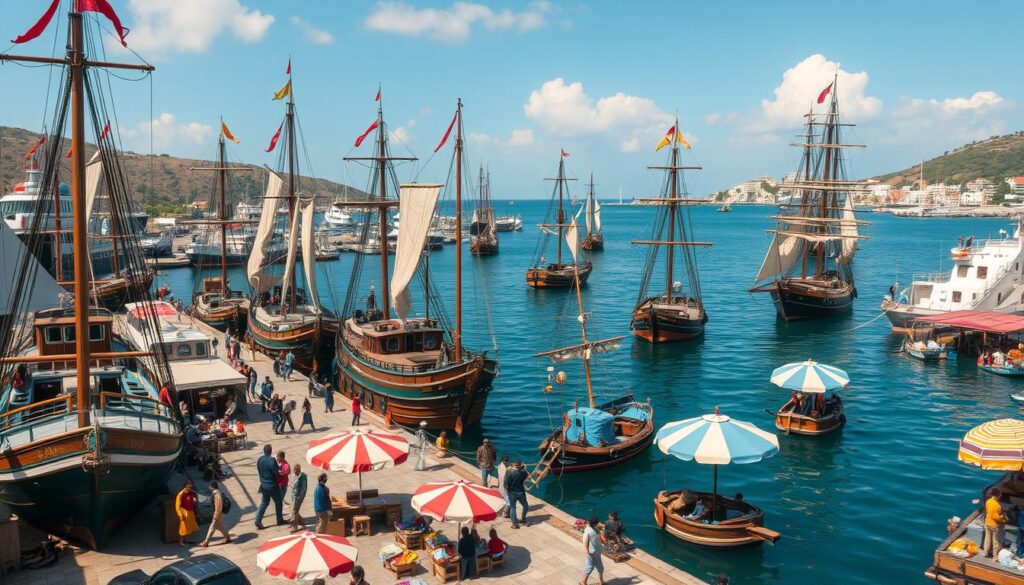
At the heart of Pentos Got’s success lies a complex web of trade routes and merchant guilds. The city’s economy is driven by its strategic location on the Bay of Pentos, facilitating extensive trade connections with both Westeros and other Free Cities.
Major Exports and Trade Routes
Pentos Got is renowned for its diverse exports, including spices, gemstones, and dragonbone, alongside its famous pale amber wine and a significant amount of cheese. The city’s ships traverse the known world, establishing it as a major hub in international trade. The fertile Flatlands surrounding Pentos ensure a steady supply of food, while fishing boats on the Bay contribute to the local economy.
The Spice Traders and Merchant Guilds
The spice traders of Pentos are particularly influential, sending their ships to distant lands in search of exotic goods like saffron and peppers. These traders, along with other merchants, are organized into powerful guilds that play a crucial role in shaping the city’s economy and politics. Their wealth and influence are significant, often determining the course of Pentoshi politics.
Economic Relationship with Westeros and Other Free Cities
Pentos maintains a robust economic relationship with Westeros, with daily ships sailing between Pentos and King’s Landing. This connection, along with trade with other Free Cities, underscores Pentos’s position as a critical economic player in the region. The concentration of wealth among a few powerful citizens is a hallmark of Pentos’s economy, where financial influence can often outweigh other considerations.
Political System and Power Dynamics
The governance of Pentos is a complex system where ceremonial and actual power coexist in a delicate balance. At the heart of Pentos’s governance lies a fascinating dynamic between the Prince and the Council of Magisters.
The Ceremonial Prince and the Council of Magisters
The Prince of Pentos holds a largely ceremonial position, nominally overseeing trade, justice, and war. However, the true power resides with the Council of Magisters, composed of at least twenty-two wealthy individuals who rule through a combination of bribery, threats, and influence. The Prince’s role is limited to summoning the Council’s sessions and occasionally serving as a diplomatic envoy, while primarily presiding over social events like balls and feasts.
The selection process for the Prince involves choosing an adult male from among the “Forty Families,” with the Magisters making a significant show of the selection process. The Prince is carried in a rich palanquin and is required to perform certain rituals, such as deflowering the “maid of the sea” and “maid of the fields” annually to ensure the city’s prosperity.
Noble Families and Their Influence
The noble families of Pentos, including the historically significant Narratys family, which produced Prince Nevio Narratys, wield considerable influence through their wealth and political connections. These families reside in grand manses, and their power is further consolidated through strategic marriages and alliances. The complex web of relationships among these families plays a crucial role in shaping the political landscape of Pentos.
Diplomatic Relations with Neighboring Powers
Pentos maintains diplomatic relations with neighboring powers, including those in Westeros and other Free Cities. The city’s strategic location on the Bay of Pentos makes it an important hub for trade and commerce, influencing its diplomatic engagements. While the Prince may serve as a figurehead in diplomatic matters, the Council of Magisters drives the actual diplomatic efforts, often navigating complex alliances and rivalries to secure Pentos’s interests and maintain its power in the region.
Pentos in the Broader Context of Essos and Westeros
Pentos, often regarded as the most vulnerable of the Free Cities, navigates a complex web of alliances and rivalries in Essos and Westeros. This vulnerability is largely due to the peace treaty with Braavos, which significantly limits Pentos’s military capabilities, restricting them to no more than twenty warships and prohibiting the hiring of sellswords or the maintenance of a standing army beyond the city watch.
Despite these limitations, Pentos maintains a friendly relationship with the other Free Cities and is generous with the Dothraki horselords who enter their domains. The city’s diplomatic strategy focuses on avoiding conflict, making it less belligerent than other cities like Lys, Tyrosh, and Myr. This approach is reflective of Pentos’s pragmatic understanding of its position within the world of Ice and Fire.
Pentos has historical and contemporary connections to Westeros, including significant shipping traffic between Pentos and King’s Landing. The city has also served as a refuge for exiled Westerosi nobles, such as Daenerys Targaryen and her brother Viserys, who were hosted by Magister Illyrio Mopatis. The marriage between Daenerys and Khal Drogo, brokered by Illyrio, highlights Pentos’s role in significant international events.
The city’s strategic importance is further underscored by its role in the geopolitics of Essos and Westeros. Pentos’s relationships with major powers, including the Dothraki and other Free Cities, demonstrate its adaptability and diplomatic finesse. As we consider Pentos’s place in the broader context of the world of Ice and Fire, it becomes clear that its vulnerability is both a challenge and an opportunity for strategic maneuvering.
In conclusion, Pentos’s position in the world of Essos and Westeros is characterized by its vulnerability, diplomatic relationships, and historical significance. The city’s ability to navigate the complex geopolitical landscape, despite its military limitations, underscores its importance in the Free Cities and its connections to Westeros, particularly King’s Landing and the legacy of the Targaryen dynasty.
